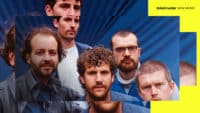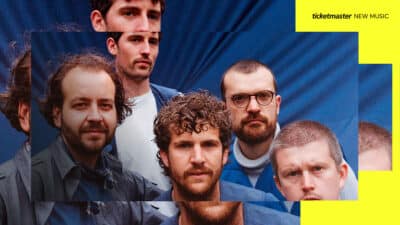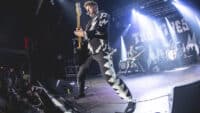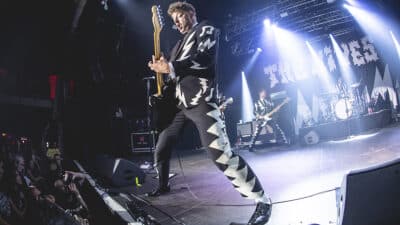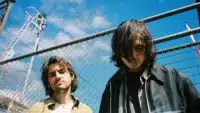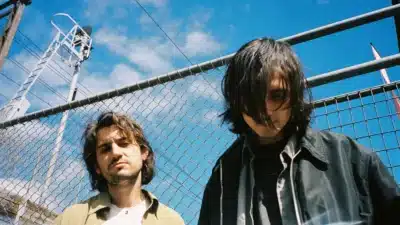Interview
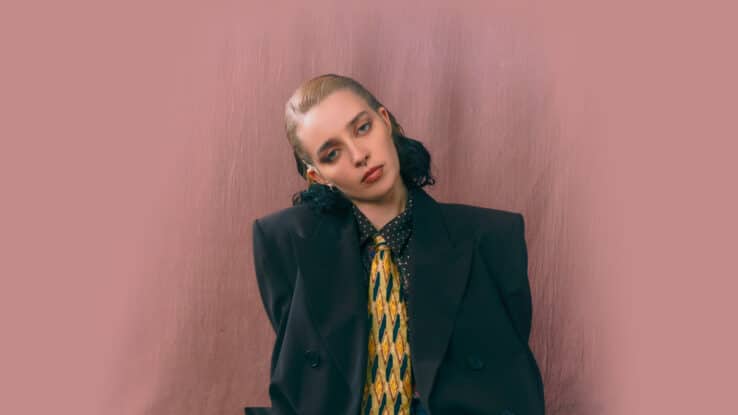
Interview
Gia Ford: “I’m kind of fearful of being honest”
The rising indie star on hiding behind metaphors and feeling murderous at work
Gia Ford doesn’t like writing songs about herself. Her debut album is a journey through the lives of others; a writing tool she uses in order to unpack her feelings from a comfortable distance. “I think, eventually, I’ll be able to kind of unearth myself, throughout my writing,” she says. “This is just the beginning. I’m coming at it from that distance for safety purposes.”
Ford’s explorative indie pop weaves in elements of folk and Americana to aid her storytelling, all with the aim of shining a light on those on the fringes. She’s interested in stories we don’t often hear and voices we don’t often hear from, letting them speak through her like a musical medium. In May, she’ll be telling these stories at The Great Escape Festival in Brighton after touring the UK with Marika Hackman in March. We caught up with Gia to discuss her songwriting process and find out what we can expect from the new album.
Could you tell us a little bit about your relationship with music growing up?
My family listened to a lot of music. My mom has really eclectic tastes. And it’s the same with my dad, to be fair, and my stepmom as well. But no one played music, so me and my cousin are really the first to actually pick up an instrument and learn it or to try and write some songs. He’s playing guitar at the moment for a Sheffield band called Cleaver Blue.
When did music become a career for you?
I was learning guitar at the time. I’d do covers and sing for my dad at the table, and he’d say, “You’ve got quite a nice voice”. And I was like, “Okay, that’s nice”. I enjoyed singing and telling stories. I’ve loved writing, and poetry, since I was a kid and they just naturally collided for me. Even when I first got discovered by my first manager, I didn’t really think anyone would ever see it. I just was putting music up on SoundCloud for my friends and family to hear. I was just doing it because I loved doing it, and then the professional element of it kind of came to me. I feel like a lot of the graft, the trying to get somewhere with it, has actually come more recently. That period of time was all quite natural, because I was just doing it for fun.
Has that felt like a big shift recently?
I think after I left my old label, I felt like I started grafting because I wanted another opportunity where I aligned with people and I was able to make music that I really wanted to put out. I had a taste of what I could do with it. It’s a craft, isn’t it, so you’re always trying to get better at it. And I feel like I’ve started being harder on myself as I’ve gotten better at it. I guess that’s natural, but I’m always trying to reclaim the kind of childhood essence of it. That’s the thing that keeps me coming back to it – even if I’m really struggling with exposure or whatever it is.
How do you try to preserve that childhood joy when you’re making art professionally?
I’m still working on it everyday when I try and write something, or I feel a spark of inspiration. It’s a conscious effort to not overthink it because a lot of that spark needs to be captured really early on in a song, then you can build on it later on. The crafting can always happen, but in that initial capturing of it, you just need to be really vulnerable with yourself and just allow whatever you want to talk about, or whatever you want to say, to come out. I don’t think I’m as good as I could be at that. I think that’s an ongoing practice, so I write about other people, because I find it really difficult to write about myself.
Why do you find it easier to write about other people’s stories?
Well, with this new batch of music that I’ve just recorded, I came to some conclusions about that. I found elements of myself in these characters that I was so drawn to. It was me trying to avoid being direct with it. And I think that’s what it is: I’m kind of fearful of being honest. I keep thinking I actually don’t really want to write about myself, because I’m not exciting enough, or there isn’t enough to say, and I don’t like wallowing in my sadness or whatever it is… So I just find it more interesting to find bits about myself through other people’s stories.
It opens that world up for a lot of exploration, visually as well. It expands my imagination, writing about other people. But it’s killing two birds with one stone, because I’m talking about myself sometimes as well, inadvertently. It’s definitely more fun than digging into my soul and trying to get something out.
What kind of stories did you gravitate towards in the writing of this album?
A lot of it is quite dark. There’s a song about a serial killer on there. That’s very me. There’s one about a stalker. It’s all about alienation. Really, every song has something to do with alienation. I feel like I’m inadvertently talking about how I felt like that for whatever reason, but I wasn’t quite sure what it was. Those characters just aligned with that feeling – they’re all separate from society in some way.
‘Falling In Love Again’ deals with that isolation and that loneliness by alluding to a widower, or someone who’s lost someone very close to them. What was the writing process like with that song?
I wrote it with Benjamin Leftwich and Joseph Wander, and that was quite a long time ago. We wrote it in, like, a day. I didn’t have many ideas that day, but one of my friends had just told me a story about their dad. There’s one line in the song that sparked that inspiration, from their story, which was him dressing his new girlfriend like the wife that he’d lost. It was a way of him regaining her or mourning her, and it was so uncomfortable but so sad and so beautiful. And I knew I had to write about that. Ben’s got this real talent for just getting to the heart of the story, and I think he was just the right person for me to write that song with. So it happened really quickly.
‘Alligator’, which was the next single from the album, has a very different sound and feel. Can you tell me a bit about where you were when you were writing that one?
I hated the fact that I kept feeling pulled back into doing music as a career, and it felt like I was shooting myself in the foot by doing that. I just wanted to write a very symbolic version of that emotion without being like, “Woe is me,” directly. I wasn’t really getting anywhere with it, even though I felt like I was pouring my heart into my music. So I think it was just about impatience. I felt like I was battling with my ego, and asking, “Why do I even want to do music so badly? Is it about this? Or is it about that?” It’s like a character study on myself, but using lots of metaphors and animals to – as usual – dance around the truth of it.
What was it like doing that character study on yourself after spending so long writing about other people instead?
I really loved writing that song because it was so quirky. I’ve always gravitated towards writing about animals, just because they usually have one part of their character that’s elevated. I try and douse every story about myself in loads of metaphors or loads of other characters, because it’s a lot easier that way. It makes me feel more comfortable doing it. But like I said before, it’s just visually more interesting, you kind of imagine the alligator, and then there’s the albatross in that song… It enabled me to use loads of visual stimuli from poems that I love. It wasn’t really uncomfortable. I felt like that all the time when I was writing that song anyway, so it was just sort of like, “Oh, whatever. It’s just a day, me talking about how I feel about the music industry again…”
‘Poolside’ is the next single – could you tell us a bit about the inspiration behind that song?
I had no ideas on that day at all. Emily Phillips, who I wrote with, she pulled out a book of 1960s bird’s-eye view photos of Los Angeles pools. And me being me, I just wanted to inject a menace into that visual. I thought about people who are alienated within that world and a pool boy came to mind. It sort of became about him feeling completely separate and alienated, and like a ghost among his customers. So he becomes a bit murderous about it all. I think we can all relate to feeling murderous at work. That was just my take on how someone like that might feel completely alienated in that space – a space that seems so beautiful and so perfect. It’s kind of happening under the surface, which is something I’d quite like to come back to. I love that song. I literally love it. It’s one of my favourites. I’m just super excited about releasing it.
You’ve been compared to acts like Joni Mitchell, Fleetwood Mac, Lana Del Rey… are these conscious influences for you? Do you feel they’re accurate?
I don’t know about being compared to Joni Mitchell, but I do love her. Lana Del Rey is someone I try and actually avoid talking about, even though I literally love her so much. But I think there are so many people that are trying to do what she does, and I’ve never tried to do that. I think she was such a huge part of me growing up in my adolescence. She’s obviously left a mark on my music; the cinematic feel of it – I’ve always felt connected to that. I’m such a visual writer and I think she is too. But I try and avoid talking about her because I don’t want to be like, “Oh, I’m trying to be Lana Del Rey…”
Who else are you listening to at the moment?
I’m having my Mitski moment, which is very late. But I just love The Land Is Inhospitable And So Are We. I think it’s absolutely insane and so beautiful. I’m also listening to loads of old jazz singers. I just read Billie Holiday’s book, Lady Sings The Blues. I’ve been listening to her, and I’ve been listening to Julie London a lot, and just those amazing singers where their voice was the centrepiece. Then there’s also some random stuff – there’s some Wings in there, Alice In Chains… It’s always a bit random.
Not to expose you, but Gia Ford isn’t the name you were born with…
I don’t know what you’re talking about at all…! No, unfortunately, it wasn’t. I do love my actual name, but it’s just too folksy for the pop world. It’s Molly McCormick. It just felt like I wanted something very memorable and short, and something that would look nice graphically. Now people interchangeably call me Gia, and Molly, even people in my family. It’s really been injected into my reality now.
At the time I chose the name, I was writing my first EP, which was quite American and pop culture-y. I just wanted something that sounded really poppy, American and memorable. And I was writing loads of random short names down that were like two syllables. I didn’t want to have a big mouthful because that was the problem with my name. I probably liked ‘Gia’ because of Gia Carangi and the movie with Angelina Jolie, and then ‘Ford’ just felt like a big American car situation. I wanted to embody the male heartthrobs at that time, like Leonardo DiCaprio and stuff, but the lesbian version. That Americana thing came into it a bit, and then GF could also be girlfriend, and I was trying to play into that side of me as well. But yeah, mainly it just rolls off the tongue in a nice way. And it’s really memorable, so I’ve stuck with it.
When you look forward five years into your career, where would you like to be?
I would like to continue my exploration of what I can do with music, and make more music with people I’ve never met before, and just keep working on the craft. And I want to be playing a lot more shows. I want to be like another three albums down the line, and still having fun.




